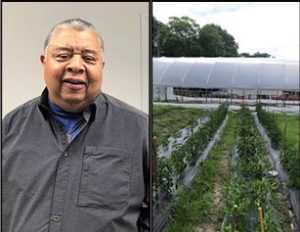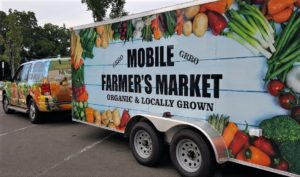
Henry’s mission is to teach others about opportunities in agriculture and provide access to healthy food.
By Dana Rogge, Public Affairs Specialist
After retiring in 2008, Henry and Ardis Crews returned to their hometown of Henderson, North Carolina, with a plan to rebuild their community as they remembered it from their childhood. They organized the Green Rural Redevelopment Organization to transform abandoned or vacant property into farms and to develop entrepreneurs in their community, form cooperatives, and educate others interested in micro-market farming.
“This is my hometown and I wanted to make it like it was when I was growing up – a real nice community,” Henry said.
Creating a Micro-Market
It was Henry’s trip to the local grocery store, and an encounter with a neighbor, that set him and Ardis down the path of micro-market farming.
Looking to buy a tomato at his local grocery store, Henry was shocked by the price tag. He noticed his neighbor, Rosetta Thorp, had a small backyard garden and asked to buy some of her tomatoes.
“She gave me some tomatoes and said ‘Mr. Crews, I grew up on a 200-acre farm. If I had more land, I could grow more,’” Henry said. “I told her I had an empty lot out there and if you’re really serious about it, I’ll get it plowed up and you can grow out there.”
This launched the beginning of their community garden and their mission of teaching others about opportunities in agriculture and providing access to healthy foods in their community.
The Crewses refer to their farm as a “micro-market” farm, meaning they grow on less than an acre of land. They currently have two micro-market farming operations, one of which serves as a farm school.
“We’ve been able to take unused land in the city, which is a rural town in eastern North Carolina, and turn them into farms,” Henry said.
Going Mobile
Henry says they are probably best known for their mobile farmers markets. To address the challenge of employment and transportation in the community, they bring the food to the customer.
“People in rural areas don’t have transportation,” Henry said. “We’re in a food desert. People get whatever they can walk to and take home.”

They set up their mobile farmers markets in various areas of the community to help those without transportation.
Equipped with their refrigerated trailers, the Crewses, and other farmers, set up at hospitals and doctors’ offices selling their produce. They’ve even expanded to offer their produce to hospital employees through a subscription-based Community Supported Agriculture (CSA) service. They offer “double bucks” at their farmers markets for Supplemental Nutrition Assistance Program (SNAP) participants, meaning the value of the SNAP benefit is doubled when used for fresh fruits and vegetables.
Empowering Future Farmers
The Crews’ Green Rural Redevelopment Organization is dedicated to teaching and empowering new and beginning farmers. They have been able to share their trials and tribulations through their farm school and by hosting volunteers on their farm.
“We are trying to let people in these communities see that they can be sustainable if they work with what they have,” Henry said. “It’s given hope to a lot of people, especially young people, our future, that there’s a new way to generate income in a rural community.”
Growing with USDA
Working with USDA’s Natural Resources Conservation Service (NRCS), Henry and Ardis were able to construct a high tunnel and install drip irrigation through the Environmental Quality Incentives Program (EQIP).
“Because we grow in small areas and we have hoop houses, we can grow year-round and we can grow specialized crops that allow us to be more competitive in the retail market,” Henry said.
They also participate in the Noninsured Crop Disaster Assistance Program, administered through the USDA Farm Service Agency, to insure their eligible commodities for crop losses caused by natural disasters.
“Everything we grow, we are dependent on selling,” Henry said. “Because we are growing in small areas, everything that we grow is important. We can’t afford to lose anything. Our margins are very small.”
Opening Doors to New Markets
For the past three years, the Crewses have been organic and Good Agricultural Practices (GAP) certified. GAP is a voluntary audit that verifies fruits and vegetables are produced, packed, handled and stored as safely as possible to minimize risks of microbial food safety hazards.
The Organic Certification Cost Share Program and cost-share assistance, from NRCS, helped to offset the costs for both certifications. Having the GAP certification opened doors to local markets for their produce.
“We found a market right here in our town, primarily with the school system,” Henry said. “They told us if we were GAP certified, they’d buy everything that we grew and change their nutritional plans based around what we were growing. That opened up a whole new area for us.”
For more information about USDA programs and to find your local service center, visit farmers.gov.






One Response to Healthy Hometown – North Carolina Couple Enriches and Educates Others in Community